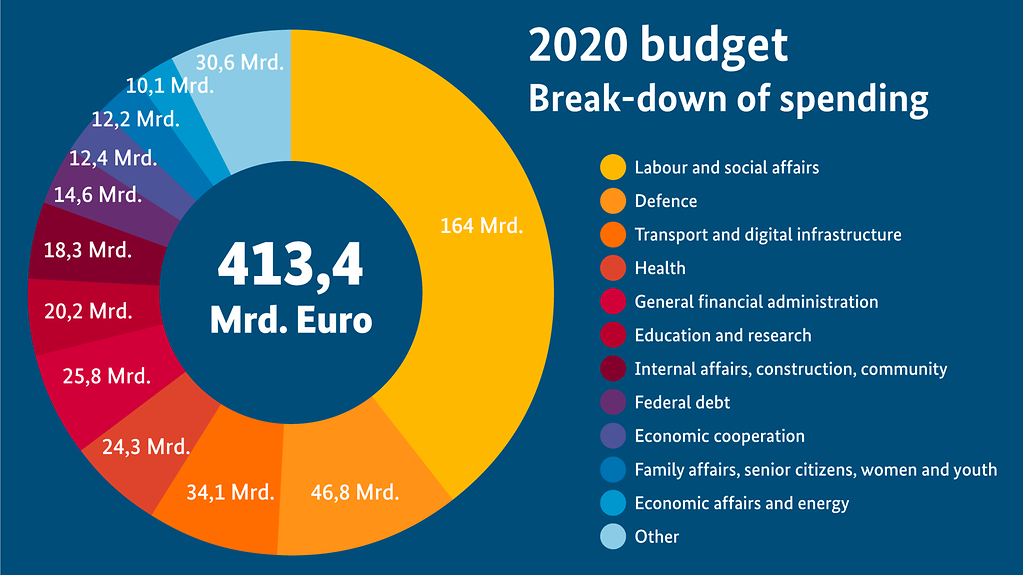FAQs on the national budget 2021
The German government has adopted responsible budget policy to address the consequences of the COVID-19 pandemic. It is continuing the recovery and future package and investing on a large scale. This is reflected in the draft national budget for 2021 and the financial plan for the period up to 2024, which the Cabinet has now approved.
3 min reading time

The draft budget for 2021 has a total volume of 413.4 billion euros.
National budget for 2021
A pie chart shows the breakdown of the total spending of 413.4 billion euros.
- 164 billion euros: labour and social affairs
- 46.8 billion euros: defence
- 34.1 billion euros: transport and digital infrastructure
- 24.3 billion euros: health
- 25.8 billion euros: general financial administration
- 20.2 billion euros: education and research
- 18.3 billion euros: interior, building and community
- 14.6 billion euros: national debt
- 12.4 billion euros: economic cooperation
- 12.2 billion euros: family affairs, senior citizens, women and youth
- 10.1 billion euros: economic affairs and energy
- 30.6 billion euros: miscellaneous
Photo: Bundesregierung
The financial plan for the coming years is designed to invest in the future, stabilise the economy and provide impetus for economic recovery. "This is a budget that is to help us get through the coronavirus crisis," said Federal Finance Minister, Olaf Scholz.
What is the scope of the national budget for 2021?
The national budget for 2021 has a total volume of 413.4 billion euros – almost 19 per cent less than the 2020 budget, but still 43 billion euros more than originally envisaged. This demonstrates that the national budget for the coming year, and indeed for the period up to 2024 will be shaped by the massive impacts of the COVID-19 pandemic.
| Target 2020 | Draft 2021 | Financial plan 2022 | Financial plan 2023 | Financial plan 2024 | |
| Expenditure in billion euros | 508.5 | 413.4 | 387.0 | 387.1 | 393.3 |
| Revenue in billion euros | 508.5 | 413.4 | 387.0 | 387.1 | 393.3 |
| Net borrowing in billion euros of this sum, exceeding the cap on debt | 217.8 118.7 | 96.2 86.2 | 10.5 --- | 6.7 --- | 5.2 --- |
| Investment in billion euros | 71.3 | 55.2 | 48.0 | 48.0 | 48.0 |
What is the impact of the COVID-19 pandemic on the budget?
The German government has responded resolutely to the coronavirus crisis and approved billions of euros in assistance under its economic recovery and future package. The assistance is designed to mitigate the immediate consequences, underpin prosperity, save jobs and ensure sustainable economic growth. Next year and in the years to come, these measures, most of which are already in effect, will be continued and financed.
How much is earmarked for investment?
The German government is countering the impacts of COVID-19 with a broad investment initiative. Spending on investment is well above the pre-crisis level, at 55 billion euros in 2021 and about 48 billion euros a year for the subsequent years up to 2024. At the same time, social insurance contributions are to remain stable in spite of the fact that social spending has risen sharply in the course of the pandemic.
What are the priorities of the German government?
The planned investment is designed to lay the foundations for sustainable, robust economic growth so that Germany is able to emerge swiftly and strongly from the crisis. Next year and in the coming budget years a lot a money is thus to be channelled into infrastructure, especially road, rail and waterways.
The German government is also supporting the federal states in the field of childcare and in strengthening education and research. Digital infrastructure and the climate-friendly restructuring of the economy are also very important.
The financial planning of the German government also covers important forward-looking projects, including the development of artificial intelligence and digitalisation in the economy and the education system; this is to include advances in quantum technology and 5G and, in the future, 6G communication technologies.
How is the spending to be financed?
In fiscal 2021, it will again be necessary to borrow in order to balance the budget. The German government will borrow a total of 96.2 billion euros, thus significantly exceeding the ceiling on borrowing laid out in the German Basic Law or constitution. This is only permissible if a majority of the members of the German Bundestag confirm that the country is facing an exceptional emergency. The German government aims to comply in full with the debt regulation again as of 2022.
From government draft to the coming into effect of the legislation – what is the procedure for the national budget? You will find a brief explanation here.